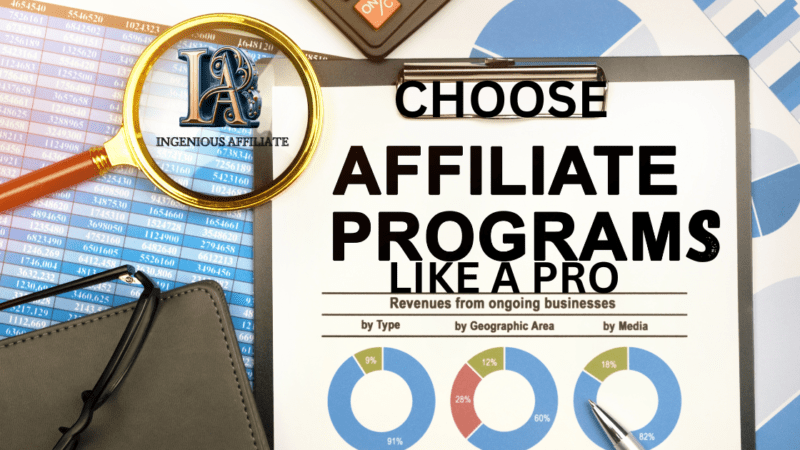10 Tips On How To Choose An Affiliate Program In 2025
The appeal of affiliate marketing and its promise of earning income by promoting products or services has made many individuals venture into this dynamic field. But how many of them are successful with the affiliate programs?
Over the past five years, I have learned that the affiliate program you decide to partner with can make or break your success. Then, what are the criteria for choosing an affiliate program whose claim sounds promising?
Ten tips on how to choose an affiliate program in 2025:
- Relevant to your Niche
- Affiliate Program Reputation
- Product Quality
- Commission Structure
- Cookie Duration
- Payment Terms and Thresholds
- Marketing Resources and Support
- Conversion Rates and Earnings Potential
- Tracking and Analytics
- Terms of Service and Restrictions

Table of Contents:
WHY DOES THE PROPER CHOICE MATTER SO MUCH?
It is simple.
The right affiliate program can lead to a solid partnership, while the wrong one can stifle your growth and diminish your reputation.
Picking the right one means teaming up with people who understand what you stand for, fit your vibe, and speak to your crowd. It is about building trust and solid connections, not just raking in cash.
However, connecting to the wrong one will affect your prestige and business evolution.
If you are new to affiliate marketing or looking to fine-tune your strategy, follow the tips below to ensure you make the most informed decision to elevate your brand, enhance your reach, and foster long-term success.
Disclosure: Some of the links on this website are affiliate links. I may earn a commission if you click through them and purchase at no additional cost. I only recommend products or services I trust and believe will add value to my readers. For more information, read the entire affiliate disclosure here.
10 TIPS ON HOW TO CHOOSE AN AFFILIATE PROGRAM IN 2025
RELEVANCY TO YOUR NICHE
Imagine this: you are running a website dedicated to endurance sports. You would not partner with a brand selling high-heeled shoes, even if it offers an attractive commission.
Right?
Instead, you would look for brands that sell sports nutrition, gear, or training equipment. This synergy between your content and the affiliate products ensures that your recommendations feel natural, not forced.
You know your audience best their interests, needs, and preferences. When choosing an affiliate program, the more it fits your niche, the more essential it is to your affiliate partnership and a higher chance of conversion.
Always before you commit examine the market.
What products or services are in demand in your niche?
Are there any gaps you could help fill?
Think of it not as today’s trends; you want to be forward-thinking, anticipating what your audience might need next. This proactive approach helps you position the platform as a source of valuable advice, not just a billboard for random products.
Remember, relevance drives engagement, and that is a clear sign that you are on the right track, reaching that sweet spot where the audience interest, product quality, and your unique voice meet.
QUALITY AND TRUSTWORTHINESS OF THE AFFILIATE BRAND
To succeed in affiliate marketing is not just about what you sell but who you partner with. Trust is a two-way street; when you represent a brand, its image reflects on you.
The quality and trustworthiness of the affiliate brand you decide to work with are paramount. Research the company whose products you intend to endorse.
Check for reviews, testimonials, and feedback from other affiliate marketers and the public to be sure the program’s reputation is top-notch.
When evaluating an affiliate program, remember that the quality of the brand and your endorsement go hand in hand!

PRODUCT QUALITY AND CUSTOMER SATISFACTION
Never underestimate the importance of quality. Beyond the lucrative commissions, the integrity of the products or services you promote significantly impacts your reputation and the satisfaction of your audience.
A product might offer an attractive commission, but if it does not deliver on its promises, your audience will be dissatisfied, and unhappy customers will not make repeat purchases.
I focus on promoting products I would use myself or feel comfortable recommending to a friend or family member. This personal rule ensures I maintain integrity and build trust with my audience. After all, residual commissions mean nothing if my customers lead to refunds.
So, partner with programs that offer high-quality products or services because your credibility is on the line whenever you recommend them. A positive reputation builds trust with your audience, who are more likely to value your recommendations and engage with your promoted products if they meet or exceed expectations.
COMMISSION STRUCTURES AND POTENTIAL EARNINGS
In affiliate marketing, commission rates and structure also play an essential role in determining the financial success of your efforts.
Look for programs that offer competitive commissions and understand whether they have a flat fee, a percentage of sales, or a hybrid framework. Additionally, check if the program has recurring commissions for subscription products.
COMMISSIONS EXPLAINED (CLICK):
Flat Fee: You earn a fixed amount per sale or action, no matter the value of the sale. For example, regardless of how much the customer spends you get $20 for every referral.
Percentage of Sales: You earn a commission based on a percentage of the total sales amount. If the product costs $200 and the commission is 10%, you earn $20 per sale.
Hybrid Framework: This is a combination of both flat fees and percentage-based commissions. You may earn a fixed amount (e.g., $10 per sale) plus a percentage from the sale (e.g., 5% of the total purchase).
Recurring Commissions: You earn ongoing commissions each time a customer renews or continues a subscription service. If someone signs up for a subscription through your referral, you get paid every time they renew, making it a long-term income source.
I always supervise the commission structures as they lead my journey to profitability. Let’s face it! The commission model is the backbone of affiliate marketing. It dictates how I make money every time someone acts on my recommendation.
I review the types and percentages of commission offered. It is not unusual to find programs with 1% to 75% commission. But all these years, I have learned that a higher percentage is not always the holy grail.
The important thing is the balance between the quality of the product and the probability of a sale. Sometimes, a lower percentage for a high-ticket item can be more profitable.
I also look for the existence of a recurring commission structure. This is where I get paid not just once but again and again for a single sale, usually because the product is tied to a subscription model. Programs offering this structure are gold mines when the alignment with my audience is spot on.
COOKIE DURATION AND ATTRIBUTION
Cookie duration is a term with which you need to be familiar in affiliate marketing. It is the period during which a cookie, once set on a prospective buyer’s device, remains active.
This period can significantly impact your chances of earning a commission. If a visitor clicks on your affiliate link and purchases after the cookie has expired, you won’t receive credit for the sale.
So, when evaluating affiliate programs, pay attention to their cookie duration. A longer one provides a better chance to earn a commission, even if the sale happens after a while.
Typical cookie durations range from 24 hours to 90 days, but some programs offer longer or even lifetime cookies. Is less often, but it exists!

PAYMENT TERMS AND THRESHOLDS
It is essential to understand the payment terms, including the payment frequency and the minimum payment threshold.
The payment frequency indicates how often you will receive your earnings, whether monthly, bi-monthly, or on a different schedule.
Do not forget about payment thresholds. If a program sets this too high, it can be frustrating to collect those commissions. That means delayed payments, impacting your cash flow and financial planning.
A threshold that is too low could result in frequent but small payments. For me, it is essential to find that sweet spot where the earnings are significant enough to be worth the effort and accessible so I don’t get stuck.
Also, you must know what payment methods are available. Ensure the affiliate program offers payment options that are convenient and accessible to you to avoid unnecessary complications.
The most common payment methods include bank transfers, checks, PayPal, and electronic payment systems.
It is also recommended to check for any fees associated with the payments, such as transaction or currency conversion fees. This way, you clearly understand the actual amount you will receive.
MARKETING RESOURCES AND SUPPORT
The marketing resources are invaluable assets that simplify the promotional process and enhance the effectiveness of your campaigns.
Choose affiliate programs that offer marketing resources like banners, widgets, and tracking tools but also have customization options to align with your brand’s aesthetics.
Banners and widgets are visual aids that significantly boost promotional activities and maintain a professional appearance. These can be in different sizes and formats to suit different platforms and channels.
Equally important is the level of support provided by the affiliate program. This could be through email, chat, or dedicated account managers.
Clear communication ensures you can promptly address queries, resolve issues, and receive guidance when needed.
Regular updates, newsletters, or webinars from the affiliate program can keep you informed about new product launches, promotions, or changes in marketing strategies, allowing you to stay ahead of the curve in your promotional efforts.
CONVERSION RATES AND EARNINGS POTENTIAL
Some programs may have higher conversion rates than others due to brand recognition, product demand, or competitive pricing.
Look for those affiliate programs with a proven track record of converting leads into customers, as this directly impacts your earnings potential.
Consider the factors that contribute to high conversion rates within your niche. Programs associated with reputable brands or on-demand products often have an advantage in capturing audience trust and interest.
Evaluate the competitiveness of prices and the quality of the products or services offered, as these elements directly influence the conversion process.
Understanding your target audience’s preferences and buying behavior within your niche can guide you in selecting programs with higher conversion potential.
Balancing competitive commission rates with high conversion rates is the key to maximizing your overall earnings.
Exploring any performance incentives or bonuses provided by the affiliate programs is also beneficial. Some programs offer additional rewards for exceeding certain sales milestones or achieving specific targets.
Understanding these incentives can motivate you to optimize your promotional efforts and strive for higher success.

TRACKING AND ANALYTICS
Programs with effective tracking mechanisms are essential to monitor the performance of your campaigns; they track conversions, understand audience behavior, and identify successful strategies and areas that need adjustment.
These tracking mechanisms include metrics such as clicks, impressions, conversions, and revenue generated from your affiliate links.
Choose programs that provide accurate and reliable tracking tools and real-time analytics to make informed decisions, refine your tactics, and optimize your affiliate marketing strategy for maximum impact.
TERMS OF SERVICE AND RESTRICTIONS
Please read and understand the terms and conditions carefully, including any restrictions on promotional methods. Some programs may have specific rules regarding advertising channels (paid search, social media, email marketing), content, or geo-targeting.
Understanding these restrictions helps you prevent any violations of the terms and warranties. It guides you to adjust your promotional strategies accordingly, creating content that resonates with your affiliate program and audience.
Therefore, it confirms that your promotional activities are transparent, honest, and respectful.
KEY POINTS TO TAKE AWAY
- Deciding on an affiliate program is not something you should rush. Armed with the insights from this article, you are now equipped to make an informed choice that aligns with your values and your audience’s needs.
- Remember that the ideal affiliate program will offer a balance between profitable commissions and relevant, high-quality products. Avoid short-term temptations and focus on building trust with your audience.
- Your responsibility extends beyond choosing a program. Stay involved with industry trends and changes. Markets change, new products emerge, and audience preferences evolve. Flexibility and continuous learning are your best tools in this dynamic environment.
- Never underestimate the power of research and diligence. Learn from others, connect with communities, and stay up-to-date. Your efforts will increase your credibility and will reflect in your earnings.
Take that next step confidently, but make sure it is with careful thought and consideration. Your success in affiliate marketing depends on it.
Now tell me:
Which factors listed above do you prioritize when choosing an affiliate program?
How do commission structures and payment terms influence your decisions?
As always, feel free to leave a message in the comments below to share your thoughts.
Your Success Partner,
Founder & Chief Editor of Ingenious Affiliate
contact@ingeniousaffiliate.com


Just wanted to take a moment to say thank you for creating this content. I found the emphasis on relevancy to my niche and the quality of the affiliate brand particularly helpful. How do you recommend balancing the need for high commissions with the importance of promoting products that align with my values and audience preferences? Looking forward to your thoughts on this! Thank you again for sharing this information.
Hi Ronald,
It is a very good question. Let’s see… I will start by emphasizing the phrase you used ‘the need for high commissions’. In general, our brain hates the idea of losing something valuable to us, so we abandon all rational thoughts and make bad decisions only to don’t lose that thing.
The same scenario applies to commissions. The fact that we don’t want to lose a high commission and have to get it makes us abandon our rationality and not consider the value that the product with this commission offers or the needs of our audience.
Sometimes we forget that we don’t need to build links but to build relationships based on trust and loyalty . That means, in some cases, we need to give up a higher commission only to deliver quality to our audience.
Of course, scenarios may vary. A higher or lower commission does not always provide quality products as well as quality products will not always have sales. But there is also the exception of finding quality products with a representative higher commission.
So my final answer to your question is MARKET RESEARCH to know your audience very well, to identify quality products that resonate with them and their needs, and also a competitive commission rate.
As I mentioned not always it will be the case. Also, don’t forget to consider programs with a recurring commission structure. Sometimes less is more!